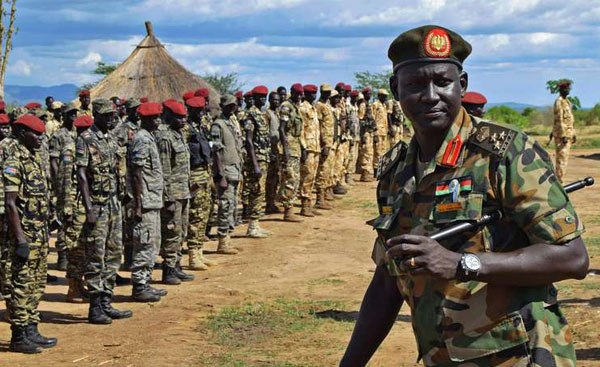South Sudan army dismisses Amnesty International’s report on sexual violence

July 26, 2017 (JUBA) – The spokesperson for South Sudan army (SPLA) has dismissed Amnesty International’s reports on sexual violence in the country, saying the rights body was “recycling old reports which lacked substance, credibility, integrity and overly one sided”.
The report, entitled “Do not remain silent,” claimed thousands of South Sudanese women, girls, and men, who were raped in ethnically-charged sexual attacks in the ongoing conflict are battling mental distress and stigma with nowhere to turn for help.
The report was based on interviews with 168 victims of sexual violence in South Sudan and in refugee camps in neighbouring Uganda, home to the world’s fastest-growing refugee crisis.
10 South Sudan human rights defenders, whose identities have been concealed, jointly worked with Amnesty International on the report.
However, the SPLA spokesperson, Lul Ruai Koang said accusations made against the military aimed at tarnishing the army’s reputation.
“The report seemed to have been authored by people with malicious intent aimed damaging reputation of SPLA for monetary benefits expected to be obtained through funding of their activities,” Koang said in response to Amnesty International’s report.
“SPLA challenges Amnesty International to produce new credible reports as well as bring forward alleged survivors of sexual violence contained in old reports to help in the identification processes of perpetrators in order for justice to be done,” he added.
The army leadership, its spokesperson stressed, is currently prosecuting soldiers accused of rape at Terrain Hotel in the capital, Juba and Kubi villages and others were convicted for other offenses.
“The above are clear indications that military leadership does not cordon impunity and violations of human rights and international,” he added.
Amnesty International’s new report unearthed aggravated acts of sexual violence against thousands of people across the country since hostilities began in mid-December 2013.
“This is pre-meditated sexual violence on a massive scale. Women have been gang-raped, sexually assaulted with sticks and mutilated with knives,” said Muthoni Wanyeki, Amnesty International’s Regional Director for East Africa, the Horn and the Great Lakes.
According to the report, perpetrators come from both sides of the conflict, pitting the pro-government forces of President Salva Kiir, a Dinka, against opposition forces of former First Vice-President, Riek Machar, a Nuer, and their respective allied armed groups.
Some of the sexual assaults occur not during the fighting, but among the millions of people sheltering from the conflict, the report stated.
The report interviewed 16 male victims, some who said they had been castrated or had their testicles pierced with needles.
Many victims said they were experiencing nightmares, loss of memory, lack of concentration, and had thought of revenge or suicide – all common symptoms of post-traumatic stress disorder.
“Some of the attacks appear designed to terrorise, degrade and shame the victims, and in some cases to stop men from rival political groups from procreating,” Wanyeki said.
“The South Sudanese government must take deliberate measures to halt this epidemic of sexual violence, starting by sending a clear message of zero tolerance, immediately ordering an independent and effective investigation into the attacks that have taken place and ensuring that those responsible are held to account in fair trials,” she added.
Last year, for instance, the United Nations reported a 60 percent increase in gender-based violence in South Sudan, with 70 percent of women in U.N. camps in the capital, Juba, having reportedly been raped since the start of the civil war in mid-December 2013.
(ST)
